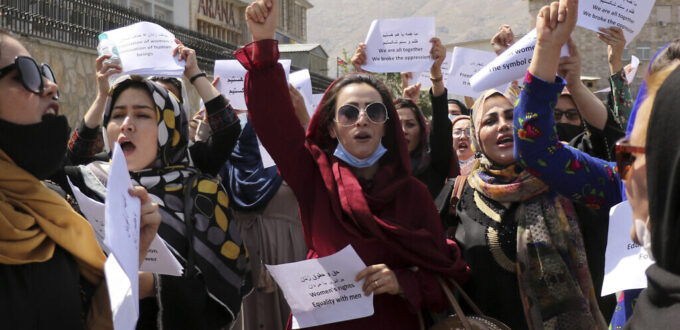Monesa Mubarez will not surrender the rights that he and other Afghan women won for 20 years of the western supported government.Before the Taliban Islamic hardline movement returned to power a year ago, the 31 -year -old player served as Director of Policy Monitoring at the Ministry of Finance.
He is one of many women, mostly in big cities, who won freedom that could not be dreamed of by a former generation under the previous Taliban rules in the late 1990s.
Now Mubarez does not have a job, after the strict interpretation of the Taliban about Islamic law which is very limited in the ability of women to work, requires them to dress and act conservatively and covered in high schools for girls throughout the country.
One war ended, but the battle to find the right place for Afghan women had begun … We will lift our votes against every injustice until the last breath,” said Mubarez, who is one of the most prominent campaigns in the Kabul Capital.
Apart from the risk of beating and detention by Taliban members patrolling the streets on weeks after the western supported government was overthrown, he took part in some broken protests, determined to protect their harsh rights.
But he and other people meet at home in private defense actions, discuss women’s rights and encourage people to join that goal. Such a meeting was almost unthinkable the last time the Taliban ruled Afghanistan.
During a meeting like that at his home in July, Mubarez and a group of women sat in a circle on the floor, talked about their experiences and chant words including “food”, “work” and “freedom” as if they were outdoors general meeting.
We fight for our own freedom, we fight for our rights and status, we work without a country, organization or eye agent. This is our country, this is our homeland, and we have the right to stay here,” he told Reuters .
Representatives of the Country for UN women in Afghanistan, Alison Davidian, said stories like Mubarez were being repeated throughout the country.
For many women all over the world, walking outside the front door of your house is the usual part of life,” he said. “For many Afghan women, this is extraordinary. This is a defense action.”
While the rules regarding the behavior of women in public are not always clear, in relatively liberal cities like Kabul they often travel without male companions. That is less common in more conservative areas, mostly in the south and east.
The Taliban treatment of girls and girls is one of the main reasons why the international community refuses to recognize the new Afghan rulers, cut billions of dollars in assistance and worsen the economic crisis.
Senior officials in several ministries said that policies regarding women were determined by top leaders and refused to comment further. The Taliban leadership has said all Afghan rights will be protected in their interpretation of sharia.
Human rights and foreign governments also blame the group for violations and thousands of civilian deaths when fighting the rebellion against foreign troops led by the US and Afghan troops between 2001 and 2021.
The Taliban said they opposed the foreign occupation, and since returning to power had sworn not to pursue revenge against former enemies. In a case where retaliation was reported, officials said that last year they would investigate.
In March, the group announced that the Women’s Middle School would be reopened, only to turn around in the morning that many girls were eager to go to school.


No Comments Yet